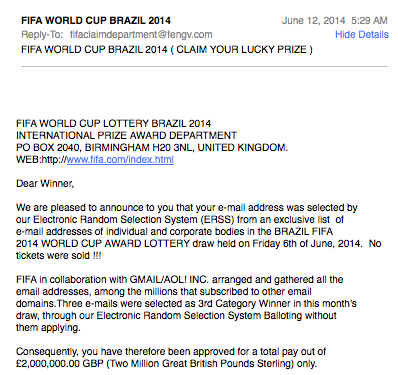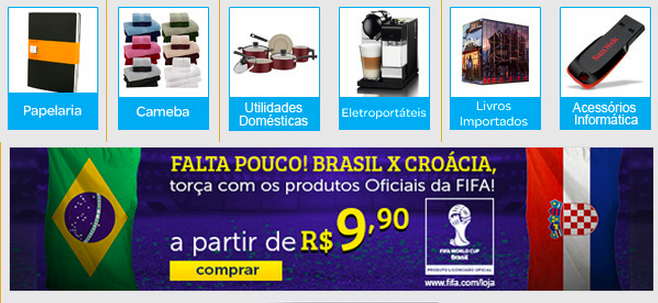As World Cup fever takes the globe by storm, spammers are capitalizing on the excitement around the event. Here's an extract from one example we have seen.

It's an advanced fee scam, similar to the "Nigerian Gold" or "Spanish Prisoner" con tricks. The victim is asked to pay an ever increasing series of fees in order to obtain an eventual huge pay out - which of course never happens. Event related spam may also offer free tickets or video streams. As well as advanced fee scams, it can also be used to trick the recipient into installing malware on their computer.
However, we have received far more spam reports from users and spam traps for marketing messages relating to the World Cup than we have for the obviously malicious forms of spam. In some cases this "grey mail" crosses the line into spam. The sort of marketing we see varies according to the local spam laws (or lack thereof). For example, the host country, Brazil, has no anti-spam laws, and Brazilian email users are constantly bombarded by unsolicited marketing emails of all sorts.

This is an extract from a Brazilian marketing email selling everything from washing machines to pets, and including link to an official FIFA web site selling branded goods.
In the UK, which has far more liberal laws on sports gambling that the US, we are seeing spam reports for both SMS and email messages from bookies.
World Cup Frenzy Begins! Up to £100 FREE Bet from [redacted]. Tap http://bit.ly/[redacted] & Use promo code F100. T&C's apply. Text UKSTOP to [redacted] to opt out
FREE MSG - Get a FREE £10 Bet on the World Cup at [redacted] on your mobile now. Click http://goo.gl/[redacted] now to join. 18+ t's & c's apply. Reply END to opt out
The UK bookies responsible for the spam are most likely following the letter of the law in that they obtained consent to send these text messages at some point. However, judging from the number of reports that we see to the GSMA's Spam Reporting System, many of their customers do not seem to have noticed that they had given this consent.
In the US we see various World Cup related marketing messages being reported as spam, with sources ranging from local sports bars and pizza joints all the way up to international fast food chains. However, they are almost all following the US CAN-SPAM rules, and contain a valid unsubscribe link. In countries with effective and enforced anti-spam laws, consumers receiving unwanted marketing messages from legitimate companies are far better off clicking on the unsubscribe link than the
Report Spam button if they don't want to see any more messages from that source.
As the World Cup demonstrates, spam is a world wide problem, but local laws and law enforcement can make a big difference to the user experience from country to country.
 It's an advanced fee scam, similar to the "Nigerian Gold" or "Spanish Prisoner" con tricks. The victim is asked to pay an ever increasing series of fees in order to obtain an eventual huge pay out - which of course never happens. Event related spam may also offer free tickets or video streams. As well as advanced fee scams, it can also be used to trick the recipient into installing malware on their computer.
However, we have received far more spam reports from users and spam traps for marketing messages relating to the World Cup than we have for the obviously malicious forms of spam. In some cases this "grey mail" crosses the line into spam. The sort of marketing we see varies according to the local spam laws (or lack thereof). For example, the host country, Brazil, has no anti-spam laws, and Brazilian email users are constantly bombarded by unsolicited marketing emails of all sorts.
It's an advanced fee scam, similar to the "Nigerian Gold" or "Spanish Prisoner" con tricks. The victim is asked to pay an ever increasing series of fees in order to obtain an eventual huge pay out - which of course never happens. Event related spam may also offer free tickets or video streams. As well as advanced fee scams, it can also be used to trick the recipient into installing malware on their computer.
However, we have received far more spam reports from users and spam traps for marketing messages relating to the World Cup than we have for the obviously malicious forms of spam. In some cases this "grey mail" crosses the line into spam. The sort of marketing we see varies according to the local spam laws (or lack thereof). For example, the host country, Brazil, has no anti-spam laws, and Brazilian email users are constantly bombarded by unsolicited marketing emails of all sorts.

